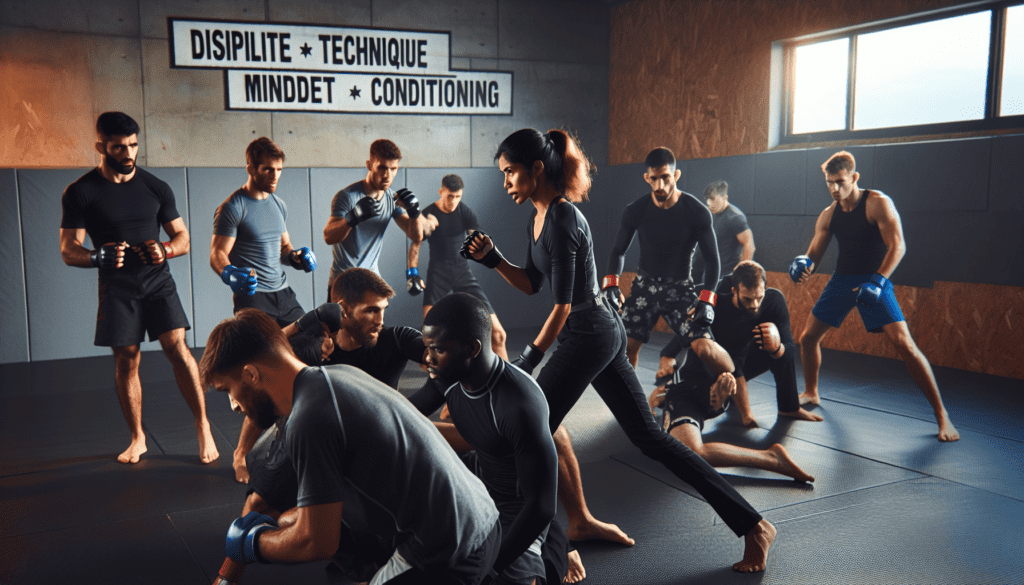So you’ve decided to embark on your journey as a beginner MMA fighter, ready to conquer the world of mixed martial arts. In order to succeed in this thrilling and dynamic sport, it’s crucial to understand and master a few key principles. From mastering proper technique and footwork to developing mental resilience and discipline, this article will explore the essential principles that every beginner MMA fighter should strive to conquer. Get ready to unleash your potential and take the first steps towards becoming a formidable force in the cage.
Physical Conditioning
To excel as an MMA fighter, it is crucial to have a solid foundation of physical conditioning. This includes building cardiovascular endurance, which allows you to maintain a high intensity throughout a fight. By engaging in activities like running, cycling, or swimming, you can improve your stamina and lung capacity, giving you the ability to keep pushing forward even when tired.
In addition to cardiovascular endurance, developing muscular strength and power is essential for executing strikes and grappling techniques effectively. Strength training exercises such as weightlifting and bodyweight exercises like push-ups and squats can help you build the necessary strength and power in your muscles. This will not only enhance your performance but also reduce the risk of injuries.
Improving flexibility and mobility is another critical aspect of physical conditioning. MMA requires you to be agile and flexible in order to execute techniques with precision and avoid injuries. Incorporating stretching routines, yoga, and mobility exercises into your training can greatly enhance your range of motion and overall flexibility.
Agility and coordination are also paramount in MMA. By incorporating agility ladder drills, cone drills, and reaction training into your workouts, you can improve your footwork, reaction time, and coordination. This will allow you to move swiftly and efficiently in the cage, making it easier to evade strikes and create opportunities for counterattacks.
Fundamental Techniques
Learning the basic strikes, including punches, kicks, knees, and elbows, is the foundation of MMA. Familiarizing yourself with proper technique and practicing them diligently will make your strikes more accurate, powerful, and efficient. Working with a skilled coach or trainer will help you develop proper form, enabling you to optimize your striking attacks.
Understanding various grappling techniques is equally important. This includes learning both submissions and takedowns. Practicing different grappling techniques such as armbars, chokes, and takedowns will enhance your ground game and give you the ability to control and submit your opponents. Additionally, gaining proficiency in defensive grappling techniques will enable you to effectively defend against submission attempts.
Mastering takedowns and throws is crucial for successfully taking the fight to the ground. By practicing takedowns such as double-leg takedowns, single-leg takedowns, and judo throws, you can effectively bring your opponent to the ground and gain advantageous positions. These techniques require practice, timing, and explosive power to execute effectively.
Practicing defensive maneuvers is equally important for self-preservation and preventing your opponent from inflicting damage. Learning how to block strikes, parry punches, and avoid kicks will significantly reduce the chances of getting hit. Additionally, understanding how to defend against takedowns and submissions can prevent your opponent from gaining control and inflicting damage.

Proper Footwork
Proper footwork is essential in MMA as it allows you to maintain balance, move efficiently, and create openings for attacks or evade opponents. Maintaining a solid stance is the first step in establishing effective footwork. Your stance should be balanced, with your weight distributed evenly between your legs, allowing you to move in any direction swiftly.
Moving efficiently and quickly is another crucial aspect of footwork. Practice drills that focus on lateral movement, pivoting, and quick direction changes. This will enable you to move in and out of range rapidly, evade strikes, and create opportunities to counterattack. Footwork drills like ladder drills, shadowboxing, and partner drills can greatly improve your movement and footwork in the cage.
Using footwork to set up attacks or evade opponents is an advanced technique that can give you a significant advantage in a fight. By footwork, you can manipulate your opponent’s positioning, create angles for strikes, and avoid being caught in dangerous positions. Mastering this skill requires practice, timing, and an understanding of distance management.
Learning to pivot and change directions seamlessly is another important aspect of footwork. Pivoting allows you to generate power in your strikes, change directions quickly, and maintain balance during lateral movements. Incorporate pivoting drills into your training regimen to develop this essential footwork skill.
Defense and Blocking
Defense and blocking techniques are critical for protecting yourself and minimizing the damage you receive in a fight. Proper guard positioning is crucial for protecting your head and face. By keeping your hands up, elbows in, and chin down, you can significantly reduce the impact of strikes to your head. This guard position creates a barrier that makes it more difficult for your opponent to land clean shots.
Utilizing blocking techniques for strikes and kicks is another important aspect of defense. Understanding different blocking techniques like forearm blocks, shin blocks, and parries can help you minimize the impact of strikes and kicks. Properly timed and executed blocks can give you the opportunity to counterattack and create openings for offense.
Learning how to defend against takedowns and submissions is equally important in MMA. This includes understanding techniques such as sprawling, which allows you to defend against takedowns, and submission defense, which involves escaping from various grappling holds. Regularly practicing defense against takedowns and submissions will significantly improve your ability to neutralize your opponent’s attacks.
Developing reflexes for evading and countering is another crucial aspect of defense. By honing your reflexes through drills and sparring, you can effectively evade strikes, slip punches, and counter with your own strikes. Quick reflexes and proper timing are vital for successfully executing defensive maneuvers.

Strategic Timing and Distance
Understanding range management is crucial in MMA. This involves knowing your range, as well as your opponent’s range, and utilizing it to your advantage. By maintaining the appropriate distance, you can maximize the effectiveness of your techniques while minimizing the risk of being hit. This requires awareness, timing, and the ability to read your opponent’s movements.
Recognizing the right moment to attack is a vital skill for any MMA fighter. Timing your strikes and takedowns can increase their effectiveness and catch your opponent off guard. This requires careful observation of your opponent’s movements and finding openings to exploit. By understanding timing, you can greatly increase your chances of success in a fight.
Maintaining an appropriate distance for different techniques is essential in MMA. Different strikes and grappling techniques require varying distances. For example, kicks require more space than punches, and clinching requires close-quarters. Understanding these distances and having the ability to control and adjust them will allow you to choose the most appropriate technique for the situation.
Knowing when to clinch or create space is another strategic consideration. Clinching allows you to control your opponent, execute takedowns, and neutralize their striking. On the other hand, creating space gives you room to strike effectively and avoid grappling situations. Developing the ability to decide when to clinch or create space will greatly enhance your versatility in a fight.
Mental Strength and Focus
While physical conditioning and technique are important, MMA is also a mentally demanding sport. Building mental resilience and discipline is crucial for overcoming challenges and pushing through adversity. Developing mental strength will help you stay focused, motivated, and composed during fights and training.
Staying composed under pressure is essential in MMA. Remaining calm and collected allows you to make clear decisions and execute techniques with precision. By training your mind to stay composed in stressful situations, you can overcome the natural instinct to panic and make more effective decisions.
Learning to analyze opponents’ movements and strategies is a valuable skill in MMA. By studying your opponent’s fighting style, strengths, and weaknesses, you can develop strategies to exploit their vulnerabilities and neutralize their strengths. This requires careful observation, analysis, and the ability to adapt your game plan during a fight.
Training mindfulness and visualization techniques can also enhance your mental strength. By incorporating practices like meditation and visualization into your training routine, you can improve your focus, concentration, and mental clarity. These techniques can help you stay present in the moment and make split-second decisions during a fight.
Effective Sparring and Training
Sparring is an essential component of MMA training as it allows you to apply techniques in a controlled and realistic environment. Finding a suitable training partner who challenges you and pushes you to improve is crucial for effective sparring. Choose partners who have similar skill levels and goals, and make sure to communicate and collaborate during sparring sessions.
Practicing different scenarios and strategies during sparring will enhance your ability to adapt to different fighting styles and situations. By simulating real fight scenarios, you can refine your techniques, test your skills, and develop effective strategies. Regularly incorporating various scenarios and strategies during sparring sessions will help you become a well-rounded fighter.
Ensuring safety during sparring sessions is of utmost importance. MMA is a high-impact sport, and injuries can occur if proper safety measures are not followed. Use appropriate protective gear such as mouthguards, gloves, and shin guards. Additionally, establish clear rules and guidelines for sparring, and always prioritize the safety and well-being of yourself and your training partners.
Providing constructive feedback and learning from mistakes is a valuable aspect of effective sparring and training. After each sparring session, take the time to discuss your performance with your training partners and coaches. Constructive feedback and analysis of your strengths and weaknesses will allow you to learn, improve, and refine your techniques.
Physical Recovery and Injury Prevention
Implementing proper warm-up and cooldown routines is crucial for injury prevention and optimal performance. A thorough warm-up prepares your muscles, joints, and cardiovascular system for the demands of training or competing. Similarly, a cooldown routine consisting of stretching and light exercises helps your body recover and reduces the risk of muscle soreness or injury.
Prioritizing rest and sleep is essential for physical recovery. During periods of rest, your body repairs damaged tissues, builds strength, and restores energy levels. Aim for 7-9 hours of quality sleep each night, and incorporate rest days into your training schedule to allow for proper recovery.
Maintaining a balanced diet and hydration is another crucial aspect of physical recovery and injury prevention. Proper nutrition provides your body with the necessary fuel and nutrients to support training and recovery. Opt for whole, nutrient-dense foods and stay hydrated by drinking an adequate amount of water throughout the day.
Understanding injury prevention techniques and seeking timely medical attention is crucial in minimizing the risk of injuries. Learn proper technique and body mechanics to avoid unnecessary strain on your muscles and joints. If an injury does occur, seek medical attention promptly and follow a comprehensive rehabilitation plan to ensure a full recovery before returning to training.
Knowledge of Rules and Regulations
Familiarizing yourself with sport-specific rules is essential to compete in MMA. Each organization has its own set of rules, so it is important to thoroughly understand and adhere to them. This includes knowing what strikes, techniques, and positions are legal, and understanding the penalties for rule violations.
Understanding prohibited techniques and fouls is crucial for fighting within the rules and maintaining sportsmanship. Certain strikes, such as strikes to the back of the head or groin, are typically prohibited and can result in penalties or disqualification. Familiarize yourself with the specific prohibited techniques and ensure you avoid them during training and competition.
Knowing how to score points and win matches is essential for success in MMA. Each organization or competition format has its own scoring system, which typically involves evaluating strikes landed, takedowns executed, and control positions established. Understanding the scoring criteria will allow you to strategize and tailor your approach to maximize your chances of winning.
Learning about different organizations and competition formats is important if you aspire to compete professionally. Familiarize yourself with the various MMA organizations and their competition formats. This can help you determine what level of competition you want to pursue and guide your training and preparation accordingly.
Continuous Learning and Improvement
Staying open-minded and receptive to feedback is crucial for continuous learning and improvement in MMA. Accepting and applying constructive criticism from coaches, trainers, and training partners will help you address weaknesses, refine techniques, and enhance your overall skill set. Be open to trying new approaches and adjusting your training methods based on feedback.
Watching and studying professional MMA fights is an excellent way to learn and gain insight into high-level strategies and techniques. Pay close attention to the movements, positioning, and strategies employed by skilled fighters. Study their footwork, combinations, and defensive techniques to enhance your own understanding and execution.
Seeking guidance from experienced coaches and trainers is invaluable for your development as an MMA fighter. Knowledgeable coaches can provide tailored guidance, create effective training plans, and help you refine your technique. Choose coaches who have experience in MMA and a proven track record of success in training fighters.
Regularly reviewing and refining techniques is necessary for continuous improvement. Revisit and practice fundamental techniques, drills, and combinations to maintain proficiency. Additionally, stay up to date with evolving trends and techniques in MMA by attending seminars, workshops, and training camps. Incorporating new techniques and concepts into your training regimen will keep your skills sharp and your game evolving.
By following these key principles, beginner MMA fighters can establish a strong foundation for success in the sport. Remember, MMA is a journey, and progress takes time and dedication. Stay focused, train hard, and continually strive for improvement, and you will be well on your way to mastering the art of MMA.

